 Central College’s tradition of service runs deep. It’s a key component of the college’s ethos. From Service Day to experiential learning in courses, Central students learn how to make a difference. Several Central alumnae share how they discovered their life’s missions and are devoting their lives to the pursuit of callings bigger than themselves.
Central College’s tradition of service runs deep. It’s a key component of the college’s ethos. From Service Day to experiential learning in courses, Central students learn how to make a difference. Several Central alumnae share how they discovered their life’s missions and are devoting their lives to the pursuit of callings bigger than themselves.
Starting With Sarah
A warm September breeze gently blew in through the open door out to The Brew’s patio as early afternoon sunlight pooled on the floor near the entrance. Relaxed chatter from the lunchtime crowd and the comforting aroma of coffee filled the air. It was the perfect summer-to-autumn transition day, and it inspired Sarah Fosdick Turnbull ’00 to order a vanilla sweet cream cold brew — the ideal drink for a fall-ish taste with a summer feel.
The setting was right for a properly caffeinated, deep dive into Turnbull’s life. A life that until 2007 was all but picture perfect.
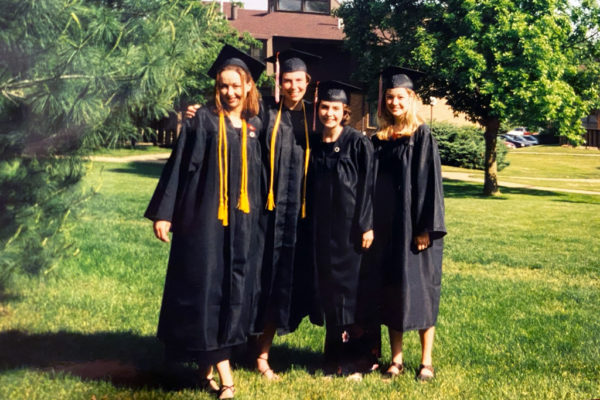
Sarah Fosdick Turnbull ’00, far left, poses with friends after graduation from Central College in May 2000.
Humble Beginnings
Turnbull grew up in Mediapolis, a pretty little town nestled in southeastern Iowa. The kind of place where you are friends with your neighbors and the entire community congregates at Cartwright Park for national holiday celebrations and special events, lawn chairs in tow. Central wasn’t really on her radar. Mostly because she came from a farming family, which meant a private, liberal arts education felt financially out of reach to the Fosdicks.
“My parents kept pushing me toward state universities because they didn’t think I could afford a college like Central,” Turnbull recalls. “But with scholarships, as well as Central’s financial aid, it was actually just as reasonable for me to go to Central as it was a state university.”
And Central was where she wanted to go. So, to Central she came, with dreams of getting a taste of all her interests: education, law, marketing and global experiences.
Living the Dream
By choosing a liberal arts education, Turnbull effectively made her dreams come true — no fairy godmother required. She earned a degree in communication studies/theatre and a secondary education endorsement; participated in Student Senate, speech, choir and theatre; and studied abroad in London, England.
“I had an internship with a member of Parliament,” Turnbull reminisces. “It was really exciting!”
Postgraduation found Turnbull putting her dreams to work. After a couple of years of working for an insurance company in Des Moines, she found her way back to Central, working in the Study Abroad Office.
“The great thing about Central is it prepared me for being well rounded and open to working in other areas,” she says. “Even if it wasn’t my major.”
When life happens, as it did to Turnbull, learning to pivot is a necessary requirement.
Turnbull’s Turning Point
In 2002, the same year she decided to make her return to Central as an employee, Turnbull married Travis Turnbull ’99 in 2002 at the Chapel on Central’s campus. Though they knew of each other during their time at Central, they didn’t make a heart connection until the fall after she graduated from Central.
“We got married two years from the day that we first went out,” Turnbull bashfully admits. A fitting venue for a Forever Dutch® couple, who were still recent enough grads that the $40 alumni discount to book the Chapel was an attractive benefit.
Two years of career enjoyment and marital bliss passed. When the Turnbull’s first child, a son named Treyton, was born in 2004, things changed.
“The biggest reason I left Central was because I had a family,” Turnbull says. The on-the-road requirements within the study abroad department were extensive, which became too difficult for her as a young wife and new mother. “I didn’t want to leave; it was the nature of a lifestyle change.”
Flash of Excitement
Turnbull worked as a stay-at-home mom for about a year before she realized she needed an outlet.
“I found out I was too much of a goer,” Turnbull says. “I needed something on the side.”
Thankfully, her liberal arts education from Central prepared her for more than a career in communications.
“The basis of my entire life is being able to go with the ebbs and flows of life,” Turnbull reflects. “Sometimes we pigeonhole ourselves into our degrees — we think, ‘This is what we must do.’ I think people need to realize that at the core, Central is preparing you for the real world in general.
“Yes, you’re going to be trained in a certain area, but you’re going to be well rounded,” Turnbull emphasizes. “So, your career might not be in your actual degree.”
It was with this adaptive mentality that Sarah’s Studio came into existence.
“I had always done photography on the side as one of my hobbies,” Turnbull says. “That, and because Central prepared me to do all the things related to owning a business, gave me the confidence to delve in.”
Turnbull’s photography business took off, and the flexibility of creating her own schedule over the next 15 years was crucial for her to be there for her family in the critical moments to come.
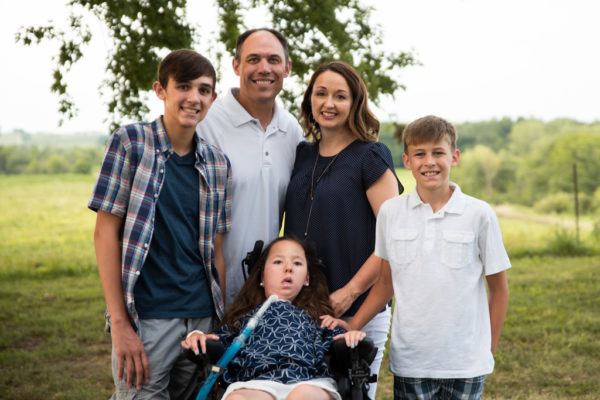
The Terrific Turnbulls Left to right: Treyton, Travis ’99, Stella, Sarah ’00 and Sayer Turnbull.
Enter Stella
Turnbull knew she couldn’t launch into a full-time career rather than teaching game. At least, it became clear when her daughter Stella was born in 2007.
She paused for a moment and took a sip of her summer-meets-autumn coffee. Refreshed, Turnbull settled in to tell Stella’s story — and what inspired her to get into public service.
Stella was born healthy as far as anyone could tell. But Turnbull’s intuition told her something was off.
“During the entire pregnancy, it felt like something wasn’t right,” she says. “Even though there was nothing medically pointed out to us, I felt like God was preparing me for something.”
Stella was born with a mottled appearance, immediately tipping off the Turnbulls and medical staff that something wasn’t right. At around one month old, Stella became floppy and quit breathing while in her car seat. The Turnbulls took her to Mayo Clinic seeking answers.
“They basically told us to ‘Take her home and love her, there’s nothing else you can do,’” Turnbull says. “We were told she had spinal muscular atrophy — she was the most severe they had ever seen — and that was it.”
In addition to SMA, Stella also was diagnosed with a vascular condition — she is the only documented case in the entire world with both conditions. Still, the Turnbulls went home with nothing for their newborn daughter. No equipment. No strategies. No help.
“They told us she would pass away in her sleep,” Turnbull says. “So, how do you even go to sleep? It was truly the grace of God supporting us because I would literally sit up in bed and hold her because I wasn’t going to let her pass away by herself.”
Despite being faced with constant decisions, swirling emotions, a lengthening list of questions and the always-present fear they would have to prepare for a funeral, the Turnbulls managed to fight for the family’s quality of life and enjoy every moment they had together.
There Was Hope
The first two years of Stella’s life included a couple of episodes of stopped breathing, multiple emergency visits and many ups and downs — a high point being the birth of her brother, Sayer, in 2008. However, even that wasn’t without its complications.
Drug therapies were available for Sayer if he had SMA, however it meant he had to be tested in utero so a specialized doctor could be flown in for the delivery. He had a 50% chance of carrying the gene. So, the Turnbulls made the decision to have Sayer tested in utero.
“I’ll never forget the day the doctor called me to say he doesn’t even carry the gene,” Turnbull says.
Relief, even at recounting the experience, visibly washed over her. And as time went on, Turnbull became a pioneer for SMA education and advocacy.
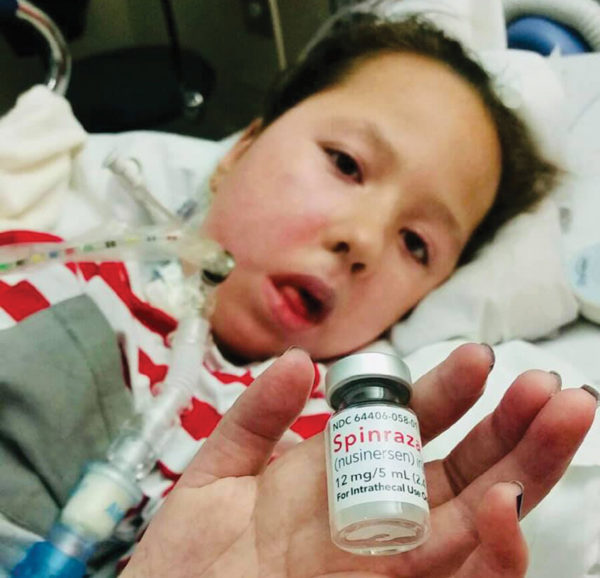
Stella Turnbull receives a SPINRAZA injection into spinal fluids every four months to stop progression of spinal muscular atrophy and maintain strength.
Leading the Charge for Change
“I feel like I’m kind of a matriarch of the disease,” she explains. “SMA is a rare disease — it affects one in 10,000 kids right at birth — and both parents have to be carriers. We didn’t know we were carriers; we have nothing in our lineage, and Travis and I both had grandparents who were big on genealogy, and there wasn’t anything to indicate genetic defects.”
It became clear to Turnbull once they had a handle on Stella’s needs that she would need to advocate for other SMA families going through crisis while in the process of learning about the disease. In 2010, Turnbull joined other SMA families in speaking at the National Institute of Health in Washington, D.C., where it was being decided whether gene therapy would be moved on toward approval from the U.S. Food and Drug Administration.
“It was such a cool experience,” Turnbull shares. “We all had blown up pictures of our children to say, ‘This is why it’s so important for children to be tested at birth. If they can get gene therapy, which literally reverses the disease, they can lead normal lives — which not only affects the child, but the entire family and generations to come.’”
Long story short: It got approved. Now anyone up to age two who is diagnosed with SMA can get therapy. But it doesn’t stop there. There are only two other therapies available to kids, even if they don’t meet the under-two-years-old threshold. Stella is taking SPINRAZA®.
The next step? Newborn screening.
“We started advocating for newborn screening. Now that we have these three treatment options, we need to get these kids screened for SMA,” Turnbull insists. “People could argue, ‘Well, it only affects one in 10,000 people,’ but if you can completely reverse that for one child out of 10,000, it’s a win.”
However, there are only so many spots on a newborn blood spot screening card. “We knew there was one more spot on Iowa’s card, so we advocated for SMA to get on there,” Turnbull delineates. “As of September of this year, on newborn screening — and at the top of the screening panel in Iowa — is that very last blood spot for SMA testing.”
Her Stella-r Choice
Turnbull often marvels over Stella’s life and journey.
“She has been given so many miracles, it’s really crazy,” Turnbull says. “But that has been her path — to show God’s glory through her life. We’ve seen people come to know the Lord through her. So when her day comes, I will never question the purpose of that.”
The dimly lit coffee shop did nothing to hide the sparkle in Turnbull’s eyes as she pored over the past and relived the moment when she realized her purpose was rooted in what she felt called to do.
“I love photography. It was pertinent for a specific chapter of my life, but it was time for me to give back,” she says. “I felt God was very much leading me to that. And several times I said, ‘There’s no way I could do that. What if we don’t have enough nursing care for Stella? What if …?’ I was just seeing a whole bunch of roadblocks and I just didn’t understand how I could do that.”
Five years slipped by as Turnbull tried to quiet the cry of her heart. That’s when she heard the song “Do Something” by Matthew West. The lyrics, “If not us, then who? If not me and you? Right now, it’s time for us to do something. If not now, then when will we see an end to all this pain? Oh, it’s not enough to do nothing; it’s time for us to do something.” It prompted her to make a purposeful and monumental life change.
“I realized I’m prepared to do this because of what I’ve been through with my daughter,” Turnbull says. “If I don’t do it, who will? And I know I can do it. I realized that because of my experience with Stella, I had turned into this person who runs toward life. It was because of Stella that I went into service.”
Shift Change
Her primary focus in life, aside from her family, is giving back to the community. So, in 2019, Turnbull became an emergency medical technician. She had only a few months of normal emergency medical services experience before COVID-19 hit.
Turnbull was given the option to step back amid ever-changing protocols because of Stella.
“I had a talk with my family about it,” Turnbull shares. “And we decided that this is what I was called to do, so that’s what I was going to do.”
Turnbull hauled a lot of patients from Pella to Des Moines and thankfully never contracted the virus.
“It was really tough seeing people get so sick so fast,” she recalls. “But it was rewarding to help them. I knew I was needed.”
Though it was an interesting time in history for Turnbull to jump into EMS, it gave her invaluable experience — and sparked her desire to do more.
“I found that there were things I couldn’t do for patients because I was an EMT,” she laments. “It bothered me that I couldn’t do other things to help patients. So, I decided I needed to go forward. And now I’m in paramedic school.”
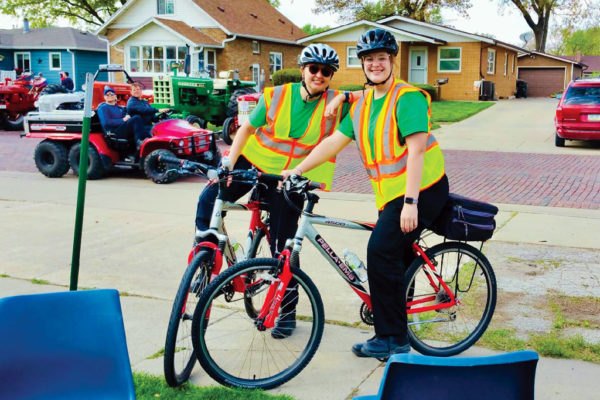
Sarah Fosdick Turnbull ’00, left, and her colleague served “Dutch style” on EMS bikes during Tulip Time.
Lifelong Learner
Nearly 20 years after graduating from Central, Turnbull started the yearlong process of becoming a paramedic in August 2021. When she completes the program, she will be a certified paramedic for the Pella community, where she is already part of the EMS team.
“The crew feels like family,” Turnbull confides. “We each have different scenarios that are triggers for us as individuals during calls. We’ve got a great crew here that’s big on making sure you take care of yourself after tough calls.”
Turnbull was a full-time EMT prior to starting paramedic school, but she was used to being on call all the time anyway.
“I’m used to going home at night and sleeping with one eye open because we don’t have home nursing at night,” she says. “So, we are always on call. It prepared me well for this job.”
Turnbull believes public service can complement a career.
“I would encourage people to look into EMT classes,” Turnbull suggests. “I know lots of people who do it in addition to a career; you don’t have to do it full time. So many communities are looking for volunteers since there’s a shortage of EMTs across the board.
“Don’t let a lack of knowledge scare you if you don’t have a medical background. You’ll get trained on all those things. If you have a heart for others, look into it!”
Speak Up and Speak Loud
Her training in flexibility and adaptation was truly cultivated by life experience. And Turnbull also credits Central with beginning that formative process.
“Central prepared me to think outside the box,” she says. “It began with ‘How am I going to help my daughter?’ which turned into ‘How am I going to help the patient I come upon when I have no idea what’s going on with them?’ I’m not sure I would have had that experience at every other college I could have attended.”
Turnbull’s experiences in student government, as well as her involvement in other activities at Central, also were a natural segue to advocacy in the real world.
“All the opportunities I had at Central helped me learn to have a voice for others,” she explains. “I’m now advocating for others who maybe aren’t as bold or can’t stand up for themselves because they’re afraid.
“Everything at Central — from activities and studying abroad to my studies and service — was shaped around having a heart for others. Central’s culture is the ability to interact with other populations and celebrate diversity through inclusivity. People don’t expect to get that in Pella, Iowa, but Central makes it a priority.”
Location, Location, Location
There must be something in the water in southeastern Iowa. The kind of something that inspires you to want to be a civil servant. Because there is a short, 15-ish mile distance between Turnbull’s hometown of Mediapolis and Burlington, which is where Central’s next heroine hails from.
Inspirations
Lisa Schwalenberg Johnson ’07 is a part-time paramedic for the City of West Des Moines Fire and Emergency Service Station. Her performance in public service takes passion — a devotion developed close to home.
“I’m a paramedic,” Johnson states. “I can say my mother was a significant influence in that passion.
“Mom and I just really love medicine, science and biology. Mom first got her EMT, and then subsequently got her firefighter’s certification. She served with Polk City Fire Department and as a volunteer for 11 years. I saw her love for that. And when I was younger, we used to watch TV shows like ‘Rescue 911’ and ‘ER.’ My love of medicine flourished between her and those shows.
“Plus, I got a really good science-based education at Central. When I went to Central, I was going for a pre-med degree to go to medical school. I basically lived in the Vermeer Science Center for three and a half years.”
Reality of a Paramedic
A paramedic is a health care professional who works in ambulances in response to 9-1-1 calls and interfacility transports. During any 12-hour shift, Johnson may attend to individuals with a heart attack, stroke, car crash, labor and delivery, mental-health crisis, shooting or an elderly person who has fallen.
It’s not the TV series ‘9-1-1: Lone Star’ with Rob Lowe running the show. Johnson admits she watched ‘Chicago Fire’s’ first episode.
“The TV program writers definitely glamorized the fire and emergency services. I couldn’t watch past the first show,” she says.
“I work as a team with a partner who is usually another paramedic or an emergency medical technician,” Johnson says. “It’s our job to figure out the puzzle and determine how to treat in the moment. Paramedics can give medications, start IVs and put breathing tubes down patientʼs throats. Our written protocols guide decisions, so if a patient is having chest pain, we have protocols to give them aspirin or give them a nitroglycerin.”
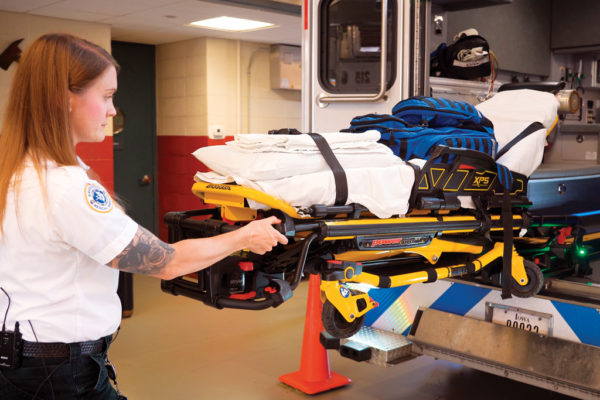
The ambulance contains most of the equipment and supplies to diagnose and stabilize patients in an emergency, including back-saving, powered gurneys. Lisa Schwalenberg Johnson ’07 explains that the blue bag is carried into virtually every call as it has everything needed to start a treatment.
It’s a job that requires critical thinking skills.
“As you might expect, there is a gray area because a lot of conditions can cause chest pain. We look at the patient, assessing and taking their vital signs. We narrow down what we think is going on and then we form a treatment plan based on the assessment. We’d give nitroglycerin if the chest pain is cardiac in origin. But the patient may be having an aneurysm and their chest feels like it’s tearing, called a thoracic aortic aneurysm or TAA,” Johnson says. “This is where your aorta wall has a weak spot and it’s getting bigger, which can cause some pretty bad chest pain. I’ve seen this and that patient did not make it. If we assess this, then we put the person in the ambulance and just drive because the ultimate way to treat them is by getting to the hospital.”
Currently, the West Des Moines full-time ambulance crew run 12-hour shifts. This changed from a 24-on/48-off schedule just before Johnson went part time in September 2020.
“It takes about three months to get your circadian rhythms shifted. This is the schedule of the firefighter team,” Johnson says.
“Staff come to work for 24 hours, and you basically live at the station. It’s like family. We cook meals together, train together, run calls together, sleep in the dorms and then we go home. If we’ve had a particularly difficult shift, it can mean taking a nap when we get home, which eats into your time off,” she adds.
The WDM department is busy, running 14,000 calls annually. It also provides support to Des Moines hospitals with transporting patients.
“The majority of calls that we have are, honestly, older people who have fallen down, and theyʼre not always injured. I thank God when they’re not injured because falls can be devastating for older people. We get serious car accidents because we cover a significant portion of the Des Moines bypass and Interstates 35/80. I’ve seen some serious traffic fatalities where people drove drunk or drove too fast. Some involved people who had medical events while they were driving and caused serious accidents. Those will live with me forever,” Johnson says.
Thinking About Mental Health
Emergency medical and firefighter staff work some traumatic and gruesome accidents. Supportive mental health is a key component of their life at the station. Johnson explains the department has a peer support team, which is mental health support for department employees.
“Our department specifically has a peer support program I helped get started just before I went from full time to part time. We go to trainings to learn how to support our peers. The crew has access to the employee assistance program, which I personally have taken advantage of myself. Sometimes you go on calls that really stick with you. And sometimes it’s hard to come to work the next day because you’re afraid to go on another call,” Johnson says.
“We have a lot of resources. We can call peers, our supervisors. We can see a therapist on our own, and we support each other in that sense. There is no stigma because we all know what we have seen on calls. We all know how damaging it can be,” Johnson says. “I feel like there’s a lot more support here than in the general population. We know what makes it hard to come to work sometimes.”
As home away from home, the station has sleeping dorms, a common day room with TVs and lounge chairs, kitchen, laundry facilities and an equipment maintenance area. The firefighters are proficient with maintenance on the fire engines and can fix most basic issues. The station also has a nice fitness center.
“Staying fit is very important for our jobs, because there’s a lot of lifting involved,” Johnson says. “We go up and down stairs carrying lots of heavy equipment. The backpacks we take on calls, like the firefighters,’ weigh 30 or 40 pounds, plus our cardiac monitor and oxygen bags. We also need to provide care to heavier patients, as the population in general is heavier. Staying in shape is really important.”
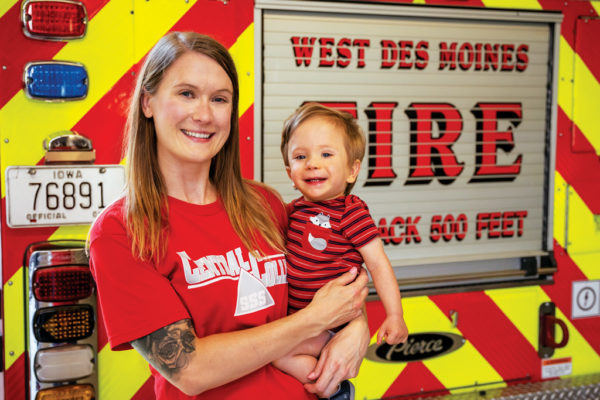
Lisa Schwalenberg Johnson ’07, holding her son Riker, has served as a paramedic with the City of Wes Des Moines Fire and Emergency Services for the past 12 years.
Rewards
“When I was younger, I did operate on the whole adrenaline junkie thing and was a risk taker,” Johnson says. “My mom and I went skydiving for her 50th birthday. I was 21 at the time. It was one of the best days of my life that was so much fun!”
The adrenaline rush has its rewards for Johnson, who has assisted on calls with narcotic or opioid overdoes.
“We carry Narcan in the unit. When we have someone who has overdosed, we start an IV and give them the drug. They are awake in about 30 seconds. We literally save their lives because we often find them blue and not breathing. When we give this medication they’re back to life. It’s transformational and incredible. Addiction is a major illness people struggle with and I like when I can be part of resolving the issue,” she says.
Similarly, Johnson has watched individuals, who have diabetes and very low blood sugar, be revived in minutes. Their life isn’t in as much peril as the heroin and narcotic overdoses, but Johnson says it’s still rewarding to watch them come back to life and the pink return to their skin.
It’s the instant gratification of emergency work.
Laying the Groundwork
Central set the stage for Johnson’s career. Johnson enjoyed all aspects about it, not just the class but the camaraderie with the other students. Her classmates were passionate about learning. Her classes prepared her for a career in public service.
“Central was warm and welcoming. We all challenged each other to get better grades. We were pushing each other constantly. I really enjoyed going to Central. I’m glad I went there versus going to a larger school,” says Johnson, who majored in biology.
“I felt like I had really good relationships with all of the professors. I could go in and talk to them, ask them for help. I wasn’t just another student sitting in a room. Central was just a great environment to learn. And that good learning environment helps foster your passion for what you’re doing.”
Johnson laughs while admitting she had a Central “Vermeer Nerds” t-shirt, shortened to “Ver-Nerds.” It was funny and featured the top 10 reasons why Vermeer is the best building on Central’s campus.
Johnson appreciated the smaller campus (she could practically walk from one end to the other in five minutes), which helped when she volunteered with the Pella ambulance.
Doug Polking, Pella Community Ambulance chief in 2004, enrolled Johnson as a volunteer emergency medical technician beginning in 2005, while attending Central. She occasionally would be called a couple of times a day during classes and had to get to her vehicle. The campus administration and faculty were very supportive of Johnson and the interruptions to her attendance in class. She learned great emergency care knowledge before going to the West Des Moines service.
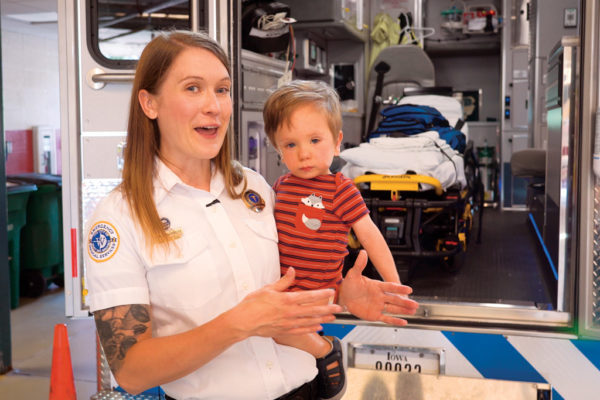
City of Wes Des Moines paramedic, Lisa Schwalenberg Johnson ’07, holding her son Riker, began her career in public service while a student at Central College.
What’s Next?
Johnson’s career journey is not finished. She came to Central seeking a pre-health degree to become a doctor but shifted focus when she went to Mercy College after graduation to become a paramedic. She admits she won’t be a paramedic forever.
Being a paramedic is really hard on your body, Johnson says.
“The physical exertion part of this job paired with the mental exertion makes for a short career. When you see these horrific calls, like child abuse, people dying at a young age, overdoses that Narcan did not bring back, not a lot of people have a full career in this job field,” she says.
Johnson plans to return to her higher education training to earn a bachelor’s degree in nursing.
“Now that I’m a mom, I hope to become a registered nurse, like my mother,” Johnson says. “I may even go for a nurse practitioner degree. I think I will always have a career in the medical field. It’s my passion and Central set the stage.”
More Amazing Alumnae
Hayley Mullins ’15
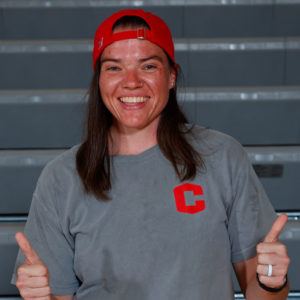 Hometown: Bedford, Texas
Hometown: Bedford, Texas
Major: Athletic Training
Campus Activities: Residence Life, Study Abroad (Wales) and Intramural Sports
Scholarships: Presidential and German Language
Career: Police Officer, Cedar Rapids, Iowa
Area of Public Service: Law Enforcement
Hayley Mullins ’15 cultivated her enjoyment of serving others at Central College. Serving others postgraduation was always part of the plan.
“During my time in the athletic training program at Central, I learned how to work with others and help athletes when they were injured as well as through their recovery process,” the Texas native shares. “I knew when I graduated, I would go into a field that involved helping others.”
Mullins graduated from the police academy in October 2021 and is still unsure of what the full scope of a law enforcement career will look like for her. However, she is determined to set a positive tone in her community.
“My job is about helping people on their worst days, and hopefully making a difference in their lives,” Mullins says. “I want to help people and serve in the community I live. I want to be a positive role model.”
She encourages others to use the Central experience to acquire a broader worldview by studying abroad and as an opportunity to create a network of connections.
“Central is a great place for an education,” Mullins says. “It’s also a great place to meet people and gain world knowledge.”
Madi Gause Wiese ’16
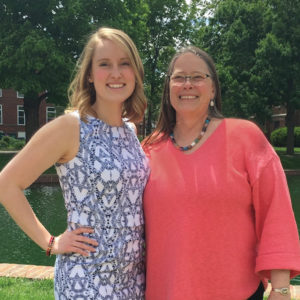 Hometown: Grinnell, Iowa
Hometown: Grinnell, Iowa
Major: Business Management, Emphasis in Finance
Campus Activities: Student Body President, Campus Activities Board, Student Orientation Staff, A Cappella Choir, Chamber Singers, Combos (ALMA)
Scholarships: Presidential, Trustee, Journey, Central Music Award, Special Central Grant and Bill ’07H and Connie Boersma Hinga ’07H Scholarship for Outstanding Campus Leadership
Career: Assistant Public Defender for the State of Iowa, Cedar Rapids, Iowa
Area of Public Service: Public Legal Services
According to the old adage, it takes a village to raise a child. Madi Gause Wiese ’16 is a product of that community construct, which set her on a path toward civil servanthood. This village instilled in Wiese the belief that it’s imperative to give back and inspired her to pay it forward.
“I knew I wanted to use my privilege to help those with less,” Wiese says. “Just like others had once done for me.”
Wiese recently passed the bar after earning a law degree from the University of Iowa College of Law. She is now an assistant public defender for the state of Iowa based in Cedar Rapids.
“Being a public defender means not judging people based on the worst day or days of their lives,” Wiese says. “It means respecting people around you and meeting them where they’re at in life.”
Hilary Beaird ’14
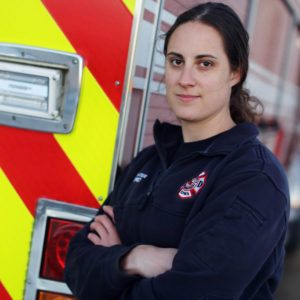
Photo Supplied By: John Lovretta, The Hawk Eye
Hometown: Burlington, Iowa
Major: Athletic Training
Campus Activities: Women’s Basketball, Angler’s Association and Club Associated with Athletic Training
Scholarships: Journey
Career: Firefighter and EMT, Burlington Fire Department, Burlington, Iowa
Area of Public Service: Firefighting and EMS
Hilary Beaird ’14 is no stranger to public service. In fact, she was generationally destined to become a public servant.
“My family has been public servants for several generations, including my grandfather, father and brother,” Beaird says. “I am humbled to follow in their footsteps.”
Beaird, an athletic training major and psychology minor, also credits Central College with a role in her pursuit of public service.
“Being on the sidelines of sporting events jumpstarted my passion for being a first responder. Central’s athletic training program is second to none and taught me many emergency skills I use today. Every year, we had an ambulance crew run us through emergency drills, which have become vital to my career,” Beaird says.
As a firefighter at the Burlington Fire Department, Beaird spends most of her workdays in an ambulance as an EMT running 9-1-1 calls and responding to fires. In addition, she is in paramedic school at Southeastern Community College.
Highlight Her
Do you know an incredible Central College alumna whose story deserves to be told? Tell us about her and she may be featured in a future issue of Civitas! Share with us at central.edu/highlight-her.











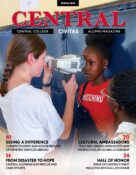
To encourage serious, intellectual discourse on Civitas, please include your first and last name when commenting. Anonymous comments will be removed.
Rich Glendening
|
10:52 pm on January 25, 2022
My daughter, Mary K Glendening who volunteered as an EMT when a student at Central. Upon graduation went Houston, TX, area “because Dad you are here, II want to go there.” She began as a medical tech at UTMB in Galveston, studied nursing at UT earning at Masters of Nursing. She practiced nursing at Ann Arbor MI, Providence, RI, before to a nursing position at Shriner’s Hospital for Burned Children in Galveston. She is head administrator for Shriners Texas Hospital in Galveston. Mary can described her responsibilities and activities better than I. Mary has replaced me on the Leighton Investment Co board.